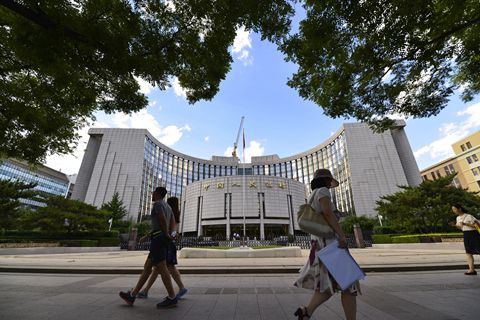Alipay Fined for Payment Rule Breach

Alipay, China’s largest mobile payment provider, was fined 4.12 million yuan ($601,860) for a violation of payment rules, according to a regulatory filing Monday by the central bank’s Shanghai branch.
The penalty is part of a stepped-up central bank crackdown on misconduct in China’s multi-trillion dollar online payment market involving hefty fines on violators. The campaign is part of the country’s broader battle against financial risks.
In the filing, the Shanghai branch didn’t elaborate on the wrongdoing by Alipay, which is an affiliate of e-commerce giant Alibaba Group Holding Ltd.
Just two weeks ago, China's foreign exchange regulator said it had fined Alipay and archrival Tenpay, which is backed by social media giant Tencent Holdings, 600,000 yuan each for violating rules on handling cross-border payments.
Alipay was accused of offering unauthorized cross-border payments while Tenpay was caught mishandling clients’ payments, the State Administration of Foreign Exchange said on July 24.
Separately, the central bank’s head office on Monday said it fined two other payment platforms — gopay.com.cn and UMF — a combined 72.9 million yuan for transgressions including failing to verify transactions, providing services for unidentified users and violating rules of capital reserve and cross-border money transfer.
Gopay.com.cn is backed by the government’s China International Electronic Commerce Center and specializes in payment services targeting government and corporate clients. UMF is an online payment platform jointly developed by the country’s largest mobile carrier, China Mobile, and China’s only bankcard association, China UnionPay.
The punishment came less than a week after the central bank slapped fines on two Shanghai-based payment companies and banned them from providing certain services for allegedly transgressing payment rules.
The recent moves reflect financial regulators’ intensifying efforts to fight crimes such as fraud and money laundering that have increasingly thrived on the internet and used loosely-regulated online payment platforms to facilitate dodgy transactions.
Since the end of last year, the People’s Bank of China has introduced a series of rules to strengthen oversight of the country’s 238 third-party payment companies as part of its efforts to crack down on financial irregularities.
The PBOC announced last month that payment firms would be required to deposit all of the prepayments by shoppers they hold temporarily with a centralized custodian by January 14, a move that aims to prevent consumer funds from being misappropriated.
Starting next year, the central bank will require third-party payment providers to report large-amount and suspicious transactions, a rule in line with commercial banks in a bid to prevent money laundering, fraud or terrorist financing.
Contact reporter Han Wei (weihan@caixin.com)

- 1Cover Story: China Carves Out a Narrow Path for Offshore Asset Tokenization
- 2Drownings Shake Chinese Enthusiasm for Travel to Russia
- 3Over Half of China’s Provinces Cut Revenue Targets
- 4Li Ka-Shing’s Port Empire Hit by Forced Takeover Amid Panama Legal Dispute
- 5In Depth: China’s Mutual Fund Industry Faces Overhaul After a Banner 2025
- 1Power To The People: Pintec Serves A Booming Consumer Class
- 2Largest hotel group in Europe accepts UnionPay
- 3UnionPay mobile QuickPass debuts in Hong Kong
- 4UnionPay International launches premium catering privilege U Dining Collection
- 5UnionPay International’s U Plan has covered over 1600 stores overseas






